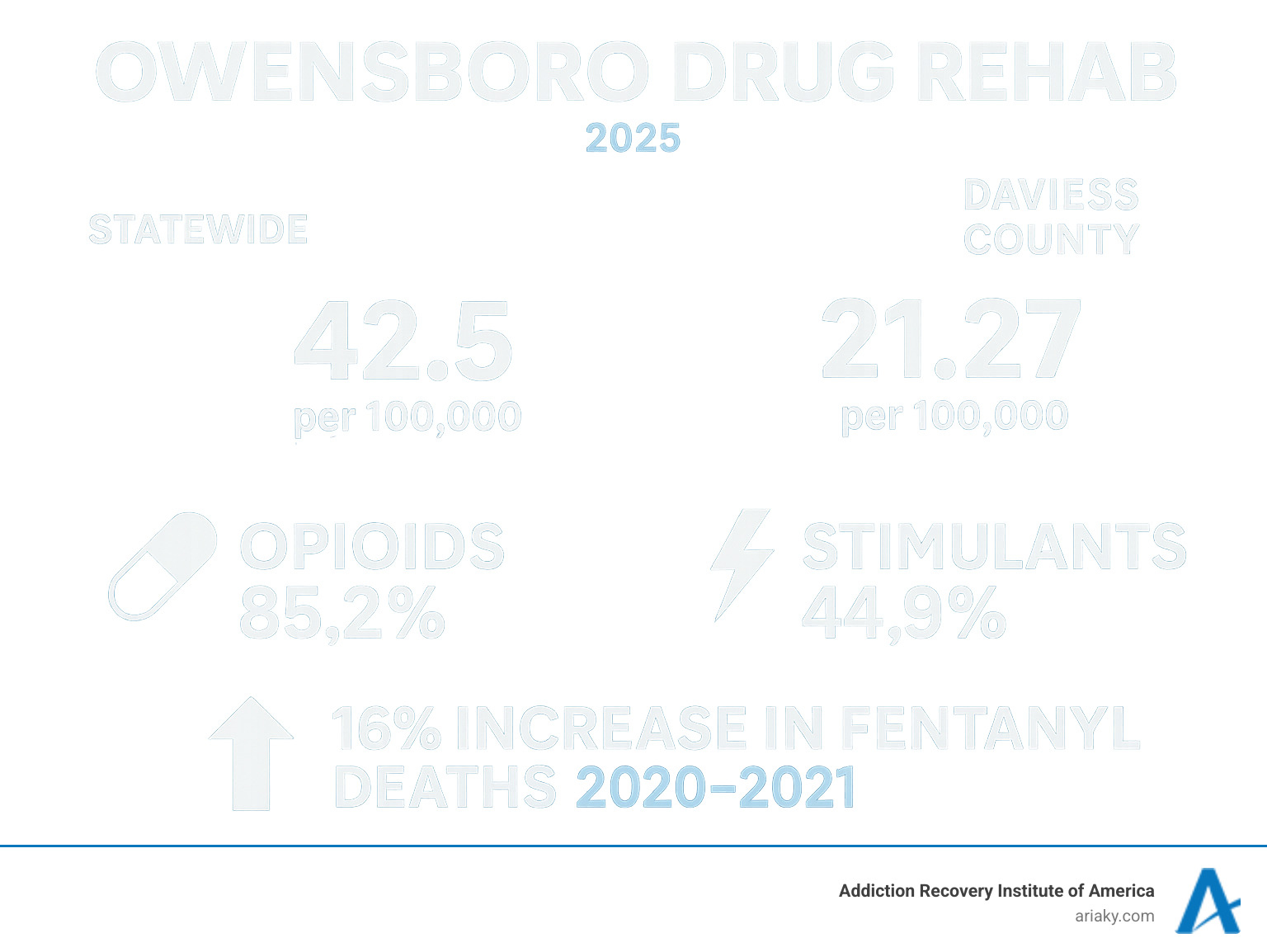Why Owensboro Needs Effective Drug Rehab Solutions

Owensboro drug rehab centers serve a community facing significant addiction challenges. Located in Daviess County, this Kentucky city needs specialized treatment options to address rising substance abuse rates.
Key Owensboro Drug Rehab Options:
- Detoxification services – Medical withdrawal management
- Residential treatment – 24/7 structured care
- Outpatient programs – Flexible scheduling options
- Dual diagnosis care – Mental health and addiction treatment
- Family therapy – Support for loved ones
Kentucky ranks third highest for drug overdose deaths nationwide. However, Daviess County shows hope – its 2021 overdose rate of 21.27 per 100,000 people is half the statewide average.
The opioid crisis hits hard here. Statewide, 85.2% of overdose deaths involve opioids, while 44.9% include stimulants like cocaine or methamphetamine. Fentanyl deaths increased 16% from 2020 to 2021.
But recovery is possible. Professional treatment centers in Owensboro offer evidence-based programs designed for lasting sobriety. From medical detox to outpatient care, these facilities provide the comprehensive support needed to overcome addiction.
This guide explores your treatment options in Owensboro. You’ll learn about different levels of care, payment options, and how to find the right program for your unique needs.

Understanding the Need for Professional Help in Owensboro
Sometimes the hardest part of recovery is recognizing you need help in the first place. Addiction is a complex medical condition that affects the brain, not a character flaw or moral failing. Just like you wouldn’t try to set a broken bone at home, addiction needs professional treatment to heal properly.
Owensboro drug rehab centers understand this reality. They treat addiction as what it truly is – a chronic disease that responds well to proper medical care and support. The good news? Recovery is absolutely possible with the right help.
Many people struggle in silence, wondering if their situation is “bad enough” for treatment. The truth is, if you’re asking that question, professional support can probably help. You don’t need to wait until you hit rock bottom to reach out.
Understanding the signs of addiction helps you make informed decisions about treatment. These warning signs show up in different ways – through changes in behavior, physical health, and emotional well-being. When you know what to look for, you can take action sooner rather than later.
Recognizing the Signs of Substance Abuse
Addiction rarely announces itself with a dramatic moment. Instead, it creeps in gradually, changing how someone thinks, feels, and acts. The signs often start small but grow stronger over time.
Uncontrollable cravings represent one of addiction’s most powerful symptoms. These aren’t just thoughts about using – they’re intense, overwhelming urges that feel impossible to ignore. People describe it as their brain being hijacked by the need for their substance.
When someone starts neglecting responsibilities at work, school, or home, it’s often because addiction has shifted their priorities. Tasks that once mattered deeply suddenly feel less important than using. This isn’t laziness – it’s how addiction rewires the brain’s reward system.
Risky behaviors become more common as addiction progresses. This might mean driving under the influence, spending money meant for bills, or putting themselves in dangerous situations to get drugs or alcohol. The logical part of their brain knows these choices are harmful, but addiction makes them feel necessary.
Withdrawal symptoms create a vicious cycle that keeps addiction going. When someone tries to quit or cut back, they experience physical discomfort like sweating, shaking, nausea, or anxiety. These symptoms can be so uncomfortable that using again feels like the only relief.
Relationship problems often multiply as addiction takes hold. Family members feel hurt, confused, and frustrated. Friends might pull away. The person struggling with addiction might isolate themselves to avoid judgment or hide their use.
Financial issues pile up when addiction becomes expensive. Money that should go toward rent, groceries, or other necessities gets spent on substances instead. This creates stress that often leads to more substance use.
If these patterns sound familiar, know that help is available. Professional treatment addresses both the physical and emotional aspects of addiction. You can learn more about comprehensive Substance Abuse Treatment Kentucky options and common Addiction Recovery Challenges that people face.
The Impact on Families and How to Start the Conversation
Addiction affects entire families, not just the person using substances. Parents, spouses, children, and siblings all feel the ripple effects. They watch someone they love change into someone they barely recognize. It’s heartbreaking and exhausting.
Family members often swing between two extremes: enabling and harsh criticism. Enabling happens when loved ones unintentionally make it easier for addiction to continue – like giving money, making excuses, or cleaning up messes. On the flip side, some families become angry and critical, hoping tough love will shock their loved one into change.
Neither approach works well on its own. Supporting without enabling requires finding a middle ground that’s both caring and firm. This balance takes practice and often benefits from professional guidance.
Starting a conversation about addiction feels scary for most families. Past attempts might have ended in arguments, tears, or slammed doors. But open, honest communication remains one of the most powerful tools for encouraging someone to seek help.
Choosing the right words makes a huge difference. Instead of saying “You’re ruining your life,” try “I’m worried about you and want to help.” Focus on specific behaviors rather than attacking their character. “When you drink, you miss family dinners and we miss spending time with you” works better than “You’re always drunk.”
Timing matters too. Don’t try to have serious conversations when someone is under the influence or hungover. Wait for a calm moment when they’re more likely to listen and respond thoughtfully.
Setting clear boundaries protects your own well-being while showing that certain behaviors have consequences. You might say, “I love you, but I won’t give you money anymore because I know it’s being used for drugs.”
You can’t force someone into recovery, but you can offer resources and support. Share information about local treatment options and let them know you’ll help them take that first step when they’re ready.
Families need support too. Resources like SAMHSA.gov/families provide valuable guidance for coping with a loved one’s addiction. Their Guide to Starting the Conversation offers practical tips for these difficult discussions.
Taking care of yourself isn’t selfish – it’s necessary. When you’re emotionally and physically healthy, you’re better equipped to support your loved one’s recovery journey.
Navigating the Levels of Care in an Owensboro Drug Rehab Program
Finding the right Owensboro drug rehab program isn’t about finding a generic solution – it’s about finding the specific level of care that matches your unique needs. Think of addiction treatment as a continuum of care, much like climbing stairs where each step builds upon the last. We don’t believe in cookie-cutter approaches because every person’s journey to recovery is different.
At ARIA Kentucky, we start every treatment plan with a comprehensive assessment. This evaluation helps us understand not just the severity of your addiction, but also your mental health, family situation, work responsibilities, and personal goals. It’s like creating a roadmap specifically for you – one that considers where you are now and where you want to go.
Our Kentucky Drug and Alcohol Rehab Programs offer this individualized approach across all levels of care. We’ve found that when treatment is custom to the person, not the other way around, recovery becomes much more achievable.
| Level of Care | Intensity | Duration (Typical) | Ideal Candidate |
|---|---|---|---|
| Detox | Highest – 24/7 medical supervision | 3-7 days | Anyone experiencing withdrawal symptoms or needing medical stabilization |
| Residential | High – 24/7 structured care | 30-90+ days | Individuals needing removal from triggers, intensive therapy, or multiple failed attempts |
| Outpatient | Moderate – Flexible scheduling | 3-6+ months | People with strong support systems who can maintain daily responsibilities |
Medically Supervised Detoxification
Detoxification is often the first step in recovery, and it’s one we take very seriously. When your body has become dependent on substances, stopping suddenly can be uncomfortable at best and dangerous at worst. We’ve seen people try to detox on their own, and frankly, it rarely works and can be risky.
Our medically supervised detox provides 24/7 monitoring by healthcare professionals who understand withdrawal. We use medications when appropriate to ease symptoms like nausea, anxiety, tremors, and sleep disturbances. More importantly, we’re there to handle any medical complications that might arise.
Think of detox as clearing the fog so you can see the path ahead. Once your body is stabilized and the substances are out of your system, you can focus on the real work of recovery. We offer specialized programs through our Kentucky Detox Programs, including our comprehensive Alcohol Detox Program KY for those dealing with alcohol dependency.
The goal isn’t just to get through withdrawal – it’s to do so safely and comfortably while preparing for the next phase of treatment.
Residential and Inpatient Treatment
Residential treatment creates a structured, supportive environment where recovery becomes your full-time focus. When you’re surrounded by triggers at home or struggling with multiple failed attempts to get sober, sometimes you need to step away completely.
Our residential program provides 24-hour support from counselors, medical staff, and peers who understand what you’re going through. You’ll participate in individual therapy, group sessions, educational workshops, and recreational activities – all designed to help you build the skills and mindset needed for lasting sobriety.
The peer community aspect is particularly powerful. Living alongside others in recovery creates natural support networks and accountability. You’ll hear stories similar to yours, learn from people who’ve walked this path, and often form friendships that continue long after treatment ends.
We remove you from the environmental triggers that may have contributed to your addiction while teaching you how to handle them when you return home. Our Residential Treatment Program KY focuses on this balance between protection and preparation. Understanding the differences between Inpatient vs Outpatient can help you determine which approach might work best for your situation.
Outpatient Programs: IOP and Standard Care
Outpatient treatment offers the flexibility to maintain your daily responsibilities while still receiving professional support. This level of care works well for people with strong home support systems, work or family obligations they can’t leave, or those transitioning from residential treatment.
Our outpatient programs include both intensive outpatient (IOP) and standard outpatient care. IOP typically involves several hours of treatment multiple times per week, while standard outpatient might be once or twice weekly sessions.
The beauty of outpatient treatment is the real-world application. You’re practicing your recovery skills in your actual environment – dealing with work stress, family dynamics, and daily triggers while having professional support to guide you through challenges.
Group therapy becomes especially valuable in outpatient settings, providing ongoing peer support and accountability. Combined with individual counseling, you get personalized attention while benefiting from shared experiences and mutual encouragement.
Our Outpatient Treatment Program KY is designed to fit into your life while still providing the structure and support necessary for successful recovery. Many people find that maintaining their daily routines while receiving treatment actually strengthens their recovery foundation.


